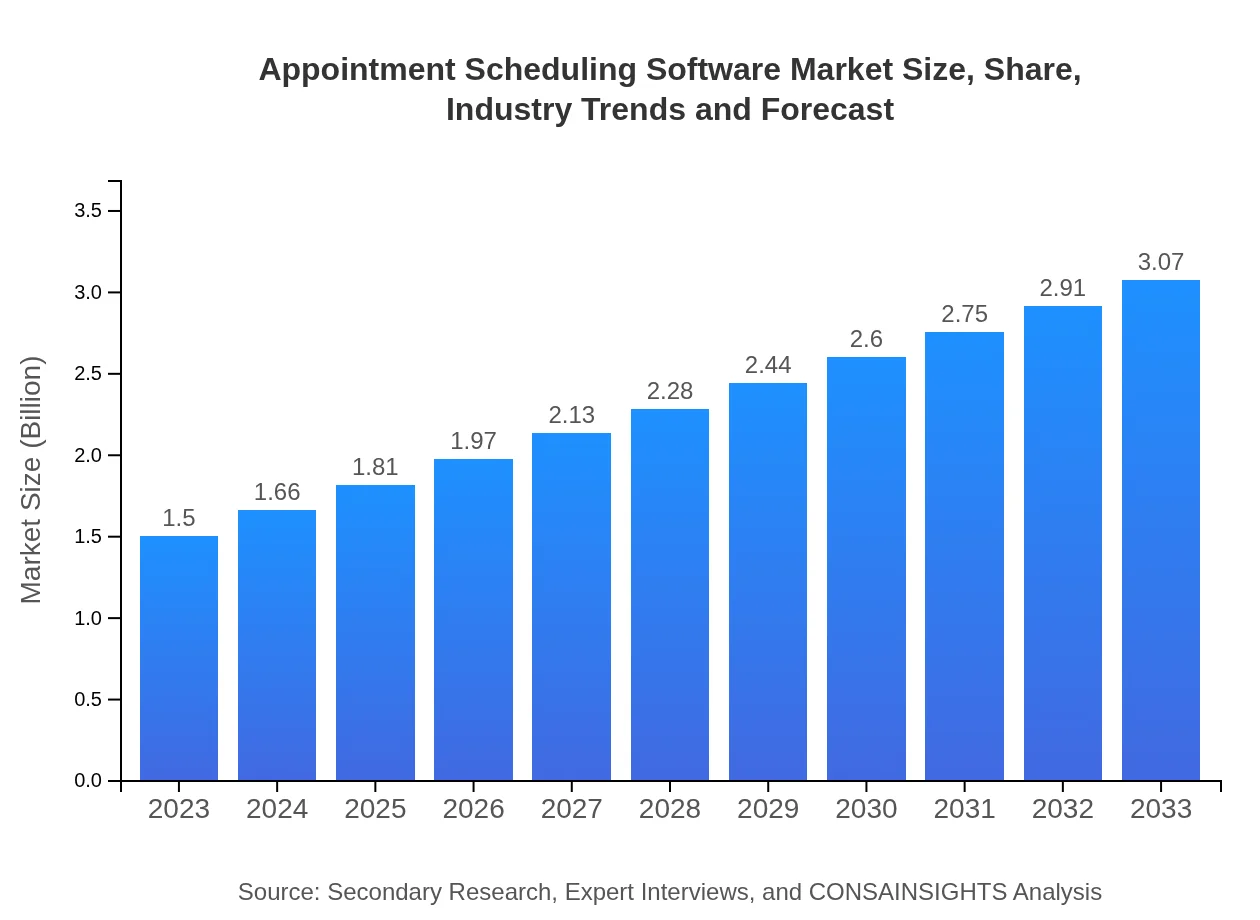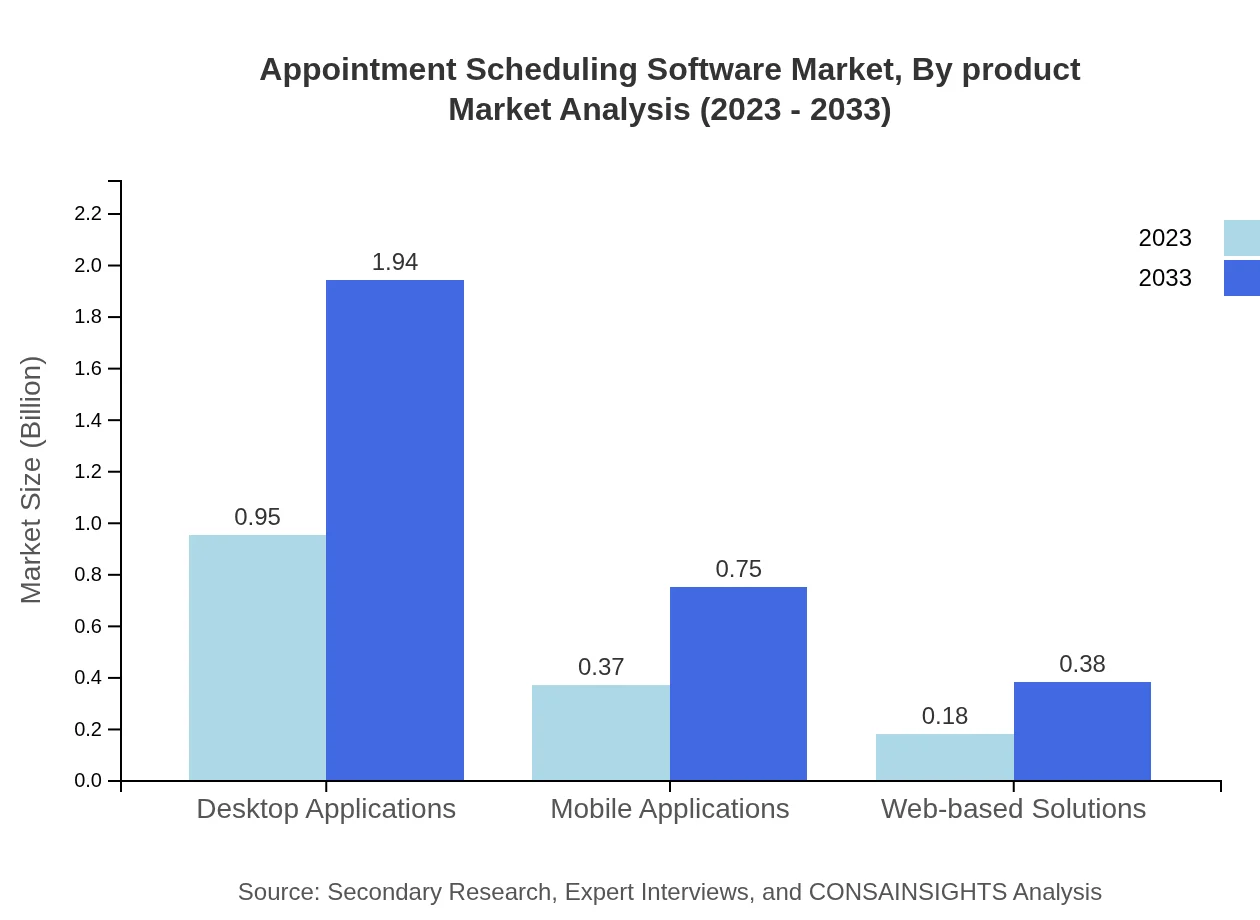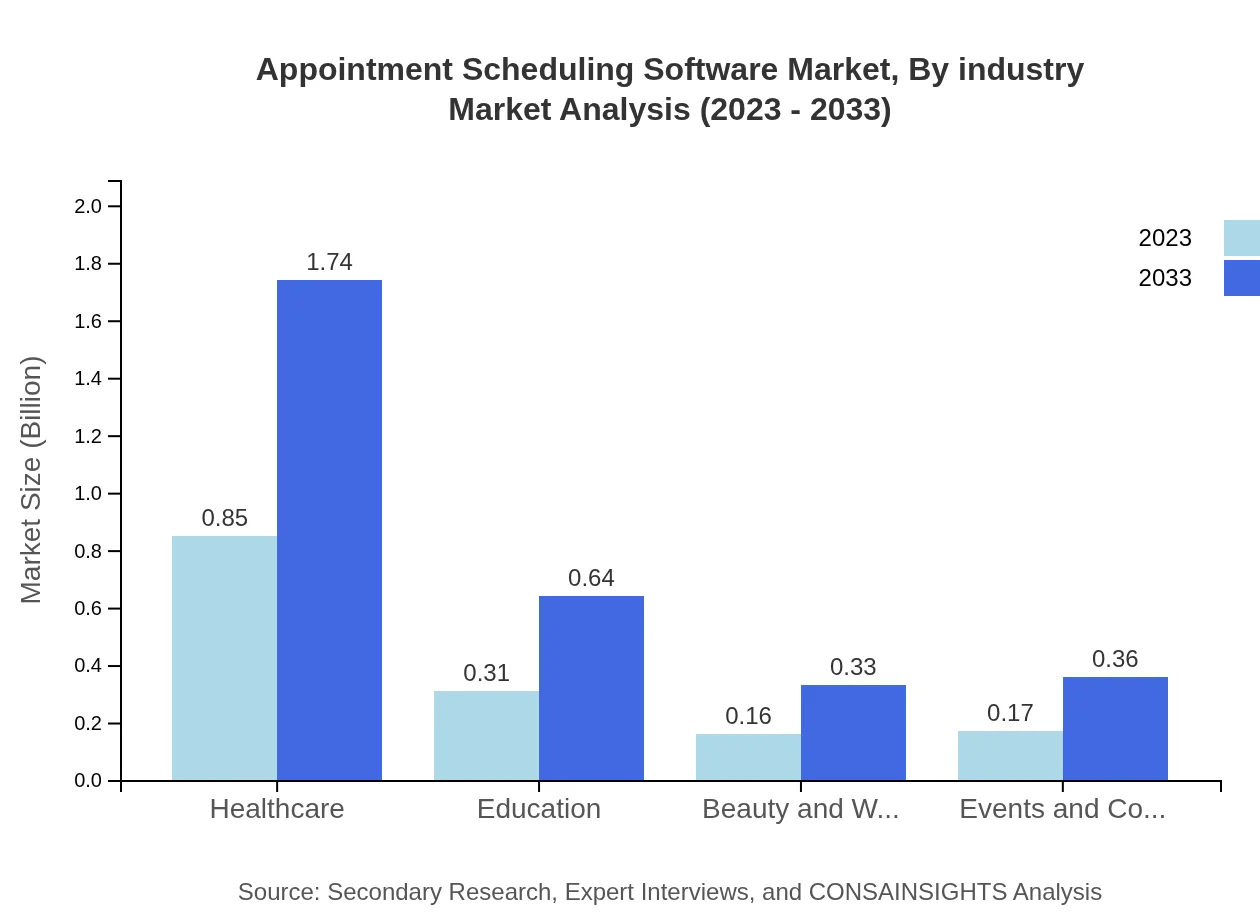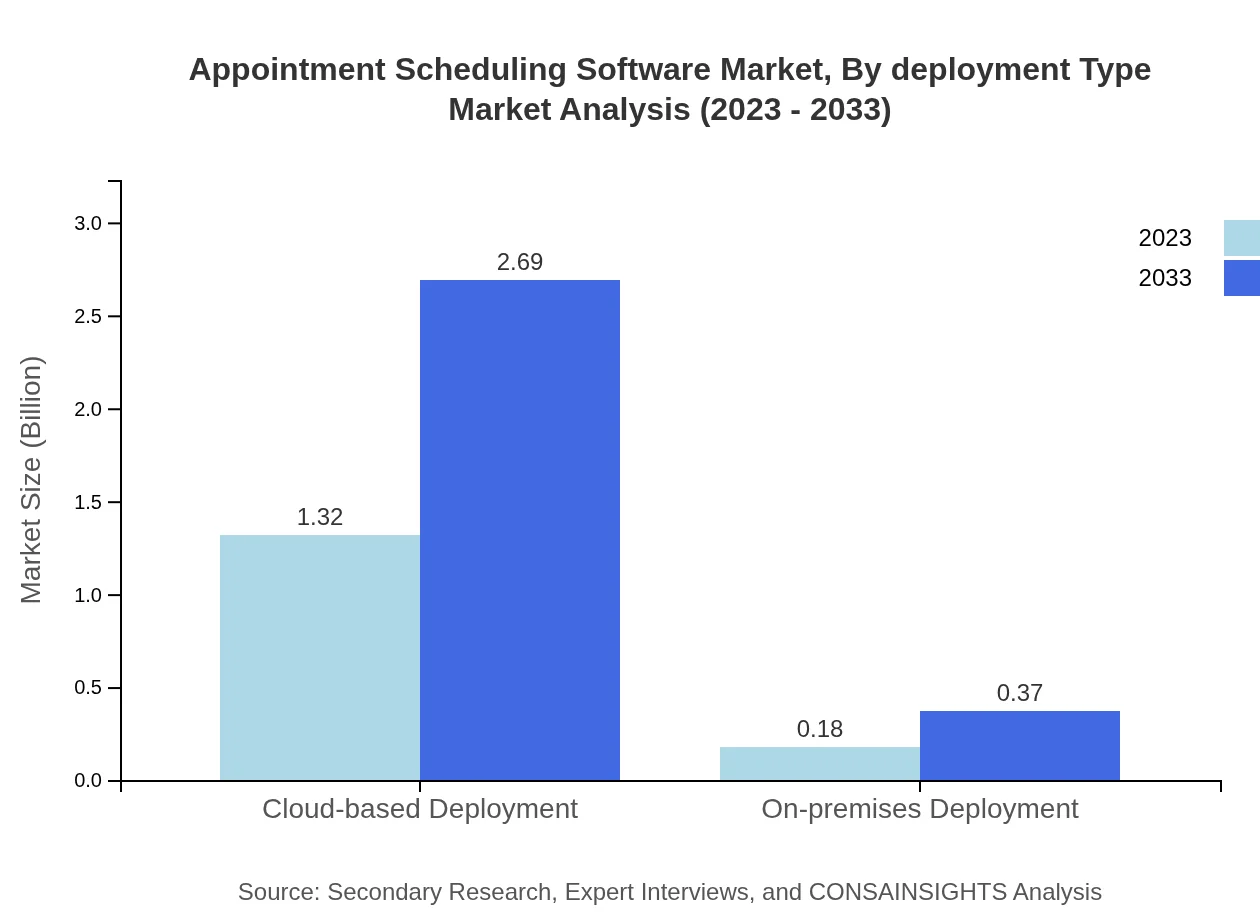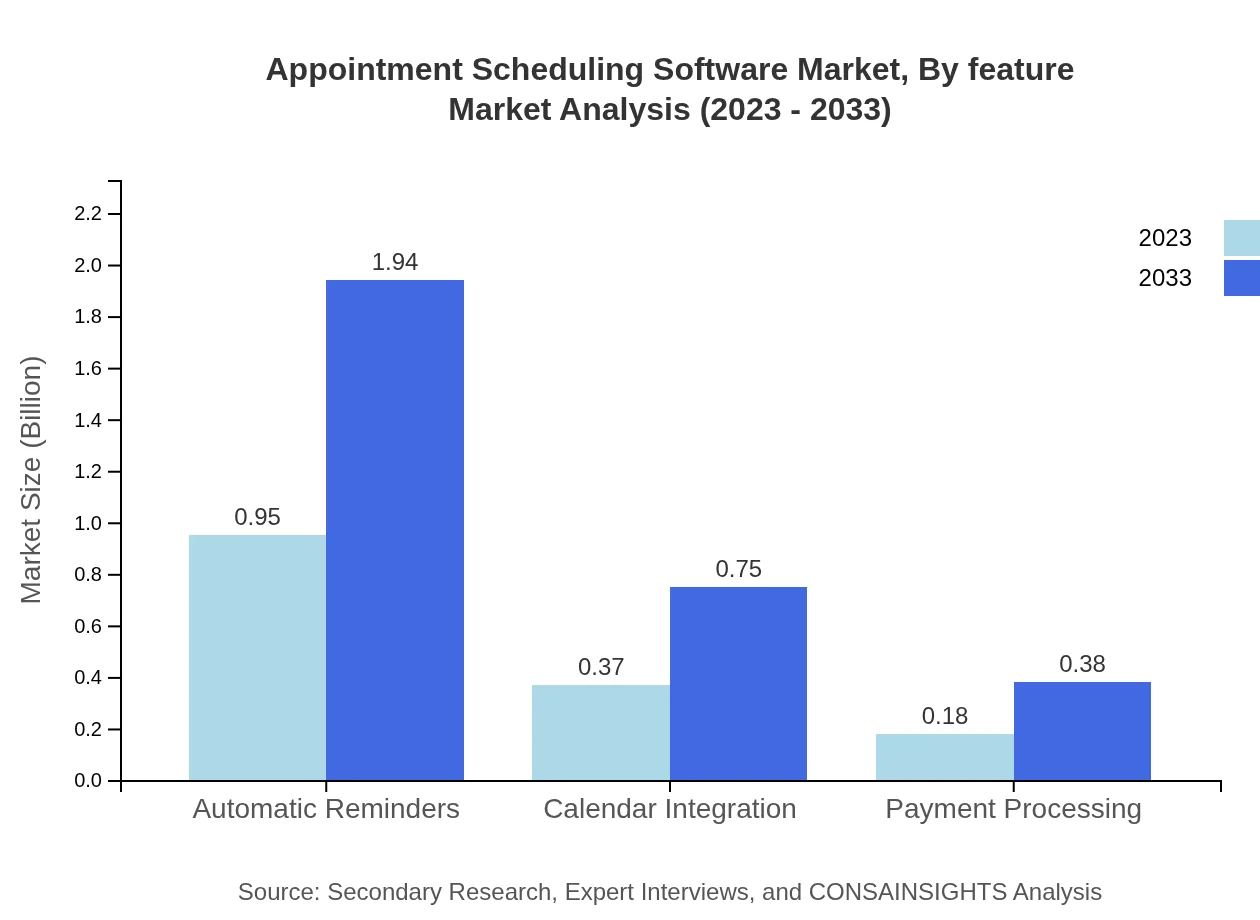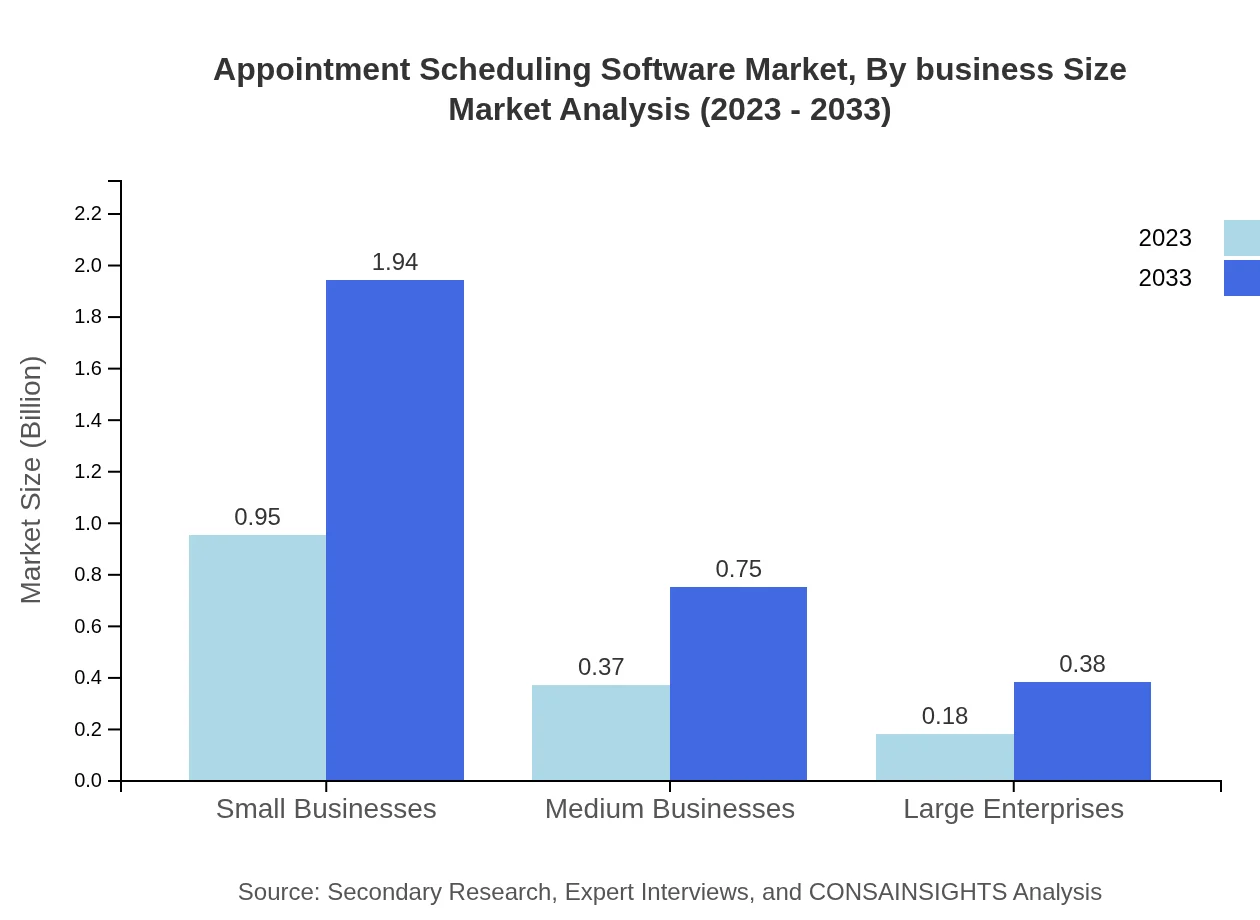Appointment Scheduling Software Market Report
Published Date: 31 January 2026 | Report Code: appointment-scheduling-software
Appointment Scheduling Software Market Size, Share, Industry Trends and Forecast to 2033
This report explores the Appointment Scheduling Software market, providing insights into market trends, size, segmentation, and forecasts from 2023 to 2033. It offers a comprehensive analysis of regional markets and industry leaders, highlighting technological advancements and future trends that will shape the landscape of this sector.
| Metric | Value |
|---|---|
| Study Period | 2023 - 2033 |
| 2023 Market Size | $1.50 Billion |
| CAGR (2023-2033) | 7.2% |
| 2033 Market Size | $3.07 Billion |
| Top Companies | Calendly, Acuity Scheduling, 10to8, Square Appointments |
| Last Modified Date | 31 January 2026 |
Appointment Scheduling Software Market Overview
Customize Appointment Scheduling Software Market Report market research report
- ✔ Get in-depth analysis of Appointment Scheduling Software market size, growth, and forecasts.
- ✔ Understand Appointment Scheduling Software's regional dynamics and industry-specific trends.
- ✔ Identify potential applications, end-user demand, and growth segments in Appointment Scheduling Software
What is the Market Size & CAGR of Appointment Scheduling Software market in 2023?
Appointment Scheduling Software Industry Analysis
Appointment Scheduling Software Market Segmentation and Scope
Tell us your focus area and get a customized research report.
Appointment Scheduling Software Market Analysis Report by Region
Europe Appointment Scheduling Software Market Report:
The European market is estimated at $0.52 billion in 2023 and projected to grow to $1.07 billion by 2033. Key trends driving growth include an increase in remote work practices and a rising focus on customer experience across various industries.Asia Pacific Appointment Scheduling Software Market Report:
The Asia Pacific market was valued at $0.27 billion in 2023 and is anticipated to grow to $0.56 billion by 2033. The region is witnessing rapid digital transformation, particularly in countries like India and China, where increasing smartphone penetration and demand for cloud-based solutions are driving market growth.North America Appointment Scheduling Software Market Report:
North America stands as a significant player in the market, valued at $0.49 billion in 2023, projected to reach $1.00 billion by 2033. The region's advanced technological landscape and high concentration of healthcare, education, and service sector industries fuel its growth.South America Appointment Scheduling Software Market Report:
In South America, the Appointment Scheduling Software market is relatively nascent, valued at $0.01 billion in 2023, expected to rise to $0.02 billion by 2033. Adoption in the region is hindered by slower digital infrastructure development, but the trend is gradually improving as SMEs begin to prioritize digital tools.Middle East & Africa Appointment Scheduling Software Market Report:
The Middle East and Africa market, valued at $0.21 billion in 2023, is expected to reach $0.42 billion by 2033. Growth in this region is driven by increasing investments in technology by both public and private sectors to enhance service delivery.Tell us your focus area and get a customized research report.
Appointment Scheduling Software Market Analysis By Product
The product segment includes: - **Automatic Reminders**: Valued at $0.95 billion in 2023 and expected to grow to $1.94 billion in 2033, it holds a dominant market share of 63.17%. - **Calendar Integration**: Market share is 24.56%, with sizes projected from $0.37 billion in 2023 to $0.75 billion by 2033. - **Payment Processing**: A smaller sector, growing from $0.18 billion to $0.38 billion, expected share remains at 12.27%.
Appointment Scheduling Software Market Analysis By Industry
Industry segmentation shows: - **Healthcare**: Market size is expected to reach $1.74 billion by 2033 from $0.85 billion in 2023, dominating with a share of 56.9%. - **Education**: Grows from $0.31 billion to $0.64 billion, with a 20.86% market share. - **Beauty and Wellness**: Valued at $0.16 billion in 2023 and expected at $0.33 billion in 2033, with a share of 10.66%.
Appointment Scheduling Software Market Analysis By Deployment Type
Deployment types include: - **Cloud-based Deployment**: Estimated to grow significantly from $1.32 billion to $2.69 billion, capturing 87.79% of the market share. - **On-premises Deployment**: A smaller market size, projected to grow from $0.18 billion in 2023 to $0.37 billion, holding a share of 12.21%.
Appointment Scheduling Software Market Analysis By Feature
Feature analysis indicates a preference for: - **Automatic reminders** remain the most utilized feature due to efficiency in customer retention and operational management. - **Calendar integration** is pivotal for synchronization with multiple platforms, enhancing user convenience.
Appointment Scheduling Software Market Analysis By Business Size
Business size segments are defined as: - **Small Enterprises**: Dominating the market at $0.95 billion, expecting growth to $1.94 billion with a 63.17% market share. - **Medium Enterprises**: Valued at $0.37 billion, projected to increase to $0.75 billion, reflecting a 24.56% share. - **Large Enterprises**: Smaller segment, growing from $0.18 billion to $0.38 billion, with a share of 12.27%.
Appointment Scheduling Software Market Trends and Future Forecast
Tell us your focus area and get a customized research report.
Global Market Leaders and Top Companies in Appointment Scheduling Software Industry
Calendly:
Calendly is a leading scheduling tool known for its user-friendly interface and extensive integrations with other productivity tools, catering to businesses of all sizes.Acuity Scheduling:
Acuity Scheduling provides robust appointment scheduling solutions with features like customization, calendar syncing, and automatic reminders, serving a wide array of industries.10to8:
10to8 is well-regarded for its comprehensive appointment scheduling features tailored for healthcare and service industries, focusing on customer service.Square Appointments:
Square Appointments offers an all-in-one appointment scheduling for small businesses, focusing on seamless payment processing and booking.We're grateful to work with incredible clients.









FAQs
What is the market size of appointment Scheduling Software?
The appointment-scheduling-software market is currently valued at approximately $1.5 billion in 2023, with projected growth at a CAGR of 7.2% through 2033, highlighting a robust demand for such solutions.
What are the key market players or companies in this appointment Scheduling Software industry?
Major players in the appointment scheduling software industry include companies such as Calendly, Acuity Scheduling, Square Appointments, and Appointlet. Their innovations drive competition and market advancements.
What are the primary factors driving the growth in the appointment Scheduling Software industry?
Growth is driven by increasing demand for efficient scheduling solutions, integration with other business tools, preference for cloud-based solutions, and the rise of remote work, enhancing productivity across sectors.
Which region is the fastest Growing in the appointment Scheduling Software?
The fastest-growing region for appointment scheduling software is Europe, with a market size expected to expand from $0.52 billion in 2023 to $1.07 billion by 2033, reflecting a growing need across various industries.
Does ConsaInsights provide customized market report data for the appointment Scheduling Software industry?
Yes, ConsaInsights specializes in providing customized market reports tailored to specific needs, enabling businesses to access precise data and insights relevant to the appointment scheduling software sector.
What deliverables can I expect from this appointment Scheduling Software market research project?
Clients can expect comprehensive reports including market size, trends, company profiles, competitive landscape analysis, segment analysis, and regional insights to facilitate informed business decisions.
What are the market trends of appointment Scheduling Software?
Current trends include rising adoption of mobile applications, integration with payment processing systems, and increased focus on user-friendly interfaces to enhance customer experience in appointment scheduling.
What key segments are included in the appointment Scheduling Software market analysis?
Key segments of the appointment-scheduling-software market include automatic reminders, calendar integration, payment processing, categorized by deployment methods such as cloud-based and on-premises solutions.

